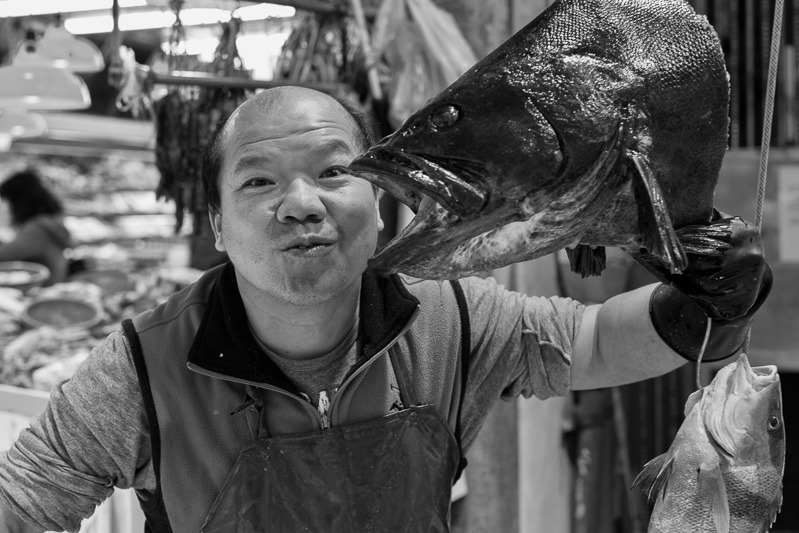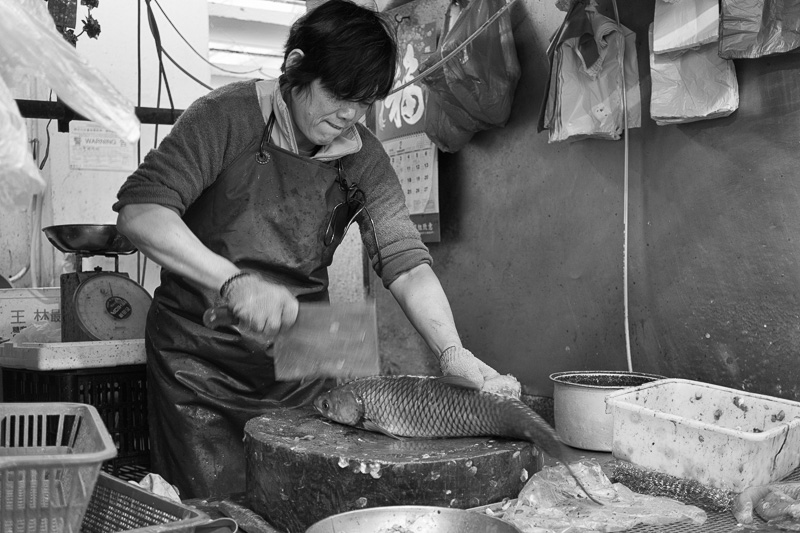
Covid-19 self-isolation is a challenge to the photographically inclined. I have an itch that won’t go away. I want to get out with my camera and wander the streets. At the same time, I live with someone whose health makes her vulnerable and it would be irresponsible of me to risk exposure to the Covid-19 virus. To satisfy my itch, I resort to the next best thing; I dive into my archives, hundreds of thousands of images, many of which I haven’t had time to examine. I share some of my finds here. Today, it’s photos from a couple fish markets in Hong Kong which I visited at the beginning of February, 2016.
There has been a lot of talk lately about so-called wet markets. Maybe the Covid-19 pandemic came from a wet market in Wuhan. At the end of January, news outlets began running stories to this effect. In the US, the news outlet’s political orientation doesn’t matter anymore. In a rare expression of solidarity, both NPR and Fox blamed Wuhan wet markets for the world’s woes. Others were conflicted. In a January 27th article, Business Insider stated that “the deadly Chinese coronavirus” didn’t originate at a wet market. A month later, on February 26th, the same source published an article holding the opposite view. The problem with all the articles from this period is that they are no better than speculation. Largely anonymous experts tell us that these markets are the sort of places where such a virus could appear and leap from animals to humans. But Business Insider isn’t exactly the Lancet and it offers no causal account that could possibly hold any weight.
The most balanced article I’ve read comes from Christopher St. Cavish, posted March 11th in the L.A. Times. He calls for a clear distinction between wet markets and wildlife markets. Wet markets are essential to China’s food supply, especially for those who cannot afford to shop in Western-style supermarkets with their plastic-wrapped meats butchered out of sight. Meanwhile, wildlife markets fill a culturally entrenched desire for exotic meats. These are two different things, although they sometimes overlap.
Wet markets become a convenient point of contention. PETA leaps aboard and urges the WHO to ban wet markets, not because they may be the source of the novel coronavirus (though there’s that), but because wet markets sell meat. Trump uses the wet markets to deflect attention from his own failures to act, calling this the Chinese virus, even scuttling a joint statement from the G7 by insisting that it be called the Wuhan virus. Then, of course, Trump defunds the WHO for being too “China-centric” and thereby enabling China’s alleged mismanagement of the situation and its lack transparency.
One can’t help but suspect that race-driven scapegoating has more play than science in this situation. Look, for example, at the treatment of Muslims in India. There can be no pretense that Muslims “caused” the virus, and yet they are blamed for Hindu infections anyways. Coronavirus is gasoline on old fires. The situation in India is instructive because it demonstrates more clearly how the pandemic gets used by a right-wing authoritarian figure to distract the populace from their leader’s shortcomings and self-dealing.
The more someone like Trump points at China and Wuhan and wet markets, the more inclined I am to suspect that he’s trying to play us. It’s more of the same: sow confusion, ratchet public discourse into screaming matches, distract us from his acts of personal enrichment. In my estimation, the more he speaks, the higher the burden of proof we must apply in assessing his claims.
